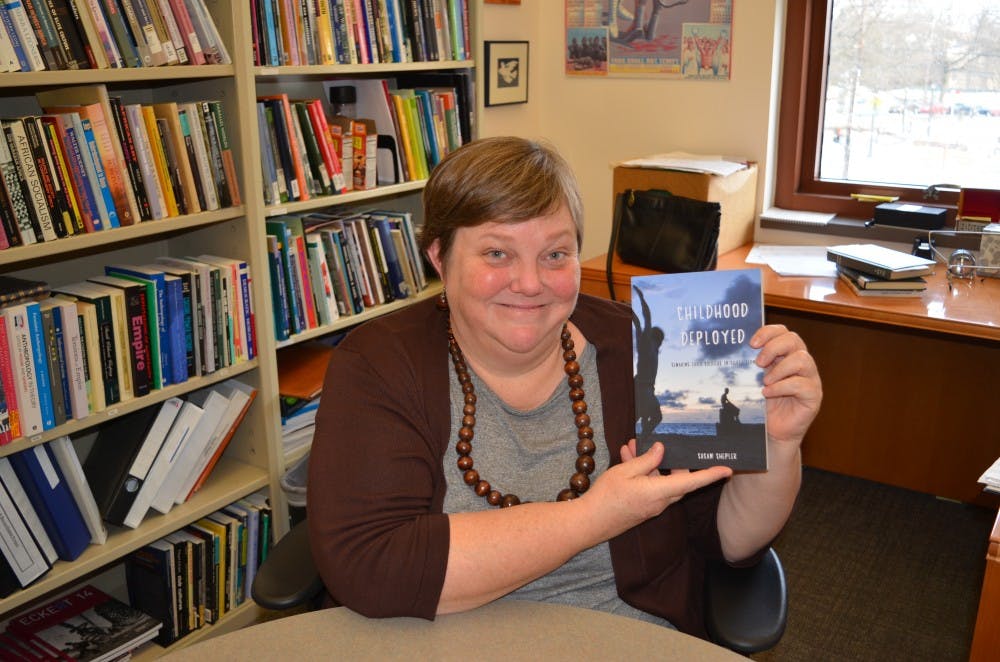AU students want to be a lot of things: policy makers, doctors and lawyers, just to name a few. But, what would AU students do if they had the choice to risk it all for a different career? The Scene answers this question with a look into strange, unassuming and brilliant careers.
A year into her Ph.D. in mathematics, Susan Shepler, Ph.D, was certain that she’d become a professor. But a Peace Corps stint in Sierra Leone led Shepler to realize that studying math wasn’t working for her anymore. Instead, she was much more interested in studying culture, specifically in West Africa, and has been teaching at AU since 2006. She is currently teaching a class at AU called “Ethnography of Diasporas.”
She switched from math to anthropology and now has over 26 years of experience working in Sierra Leone on issues ranging from child soldier reintegration to the Ebola crisis. Shepler’s career trajectory is inspiring for those interested in the Peace Corps or anthropology but also for those who are uncertain about what they want to do for a living.
“I went from being in an undergraduate program where I was one of the best students to a Ph.D. program where I was mediocre,” Shepler said. “I did [math] because I liked being the smartest one in class, not because it was something I really loved.”
Shepler’s interest in math was inspired by a desire to prove to her engineer father that girls were also smart and capable at math. Born in San Diego, California, Shepler moved to Santa Maria, California, when she was 15 years old and attended University of California at Santa Cruz and University of California at Berkeley.
Shepler studied mathematics as an undergraduate and joined the Peace Corps immediately after graduation, so in Sierra Leone, Shepler worked as a high school math teacher.
“I had a kind of social justice perspective on inequalities in math education,” Shepler said. “Everyone should have access to math. I was a math missionary.”
Shepler said she went into the Peace Corps thinking that she was going to make a huge difference and, upon her return, wondered if she made much of a difference at all. But upon returning to Sierra Leone, Shepler has been approached by former students who’ve gone on to do great things who thank her for teaching them math.
Teaching has always been a passion of Shepler’s, and she said she loves AU for its large population of supportive international students and colleagues plus the support for interdisciplinary studies.
“A lot of other universities I was looking at were very ‘ivory tower’ while AU is more about having an impact in the world,” Shepler said.
Shepler returned from Sierra Leone on Jan. 12. During her trip, Shepler, along with another AU professor, were studying the impact of Ebola on the community of Freetown.
“I’m happier [in Sierra Leone] than I am here,” Shepler said.
Shepler and Nina Yamanis, an AU professor who researches public health, wrote a blog together called “Sierra Leone’s Invisible War.” Yamanis focused on the public health aspects of the Ebola crisis while Shepler focused on the cultural aspects.
“I’m happier [in Sierra Leone] than I am here,” Shepler said. “When I went with Nina, she said ‘Wow, you seem really different here, more relaxed and more happy.’”
Shepler’s primary area of focus was child soldier reintegration in West Africa. Shepler’s first book, “Childhood Deployed: Remaking Child Soldiers in Sierra Leone,” which was based on her dissertation, was just published last summer. She plans to write her next book about education and armed conflict in West Africa, and she has numerous Ebola related research projects in mind for the future.
Ebola action films. Photo by Adena Maier.
Shepler has plans to return to Sierra Leone soon, and she is going to co-edit an issue of an anthropology journal with a professor at the University of Notre Dame who also works on Sierra Leone. The issue will focus on anthropology’s engagement with the Ebola crisis. She also has plans to work with AU professor Lindsey Green-Simms, who studies Nigerian film, to analyze some Ebola melodrama films that were produced in Sierra Leone.
There’s no indication in Shepler’s office that she studied math for a significant portion of her life. A bright Rwandan tapestry that she got from an alt break where she was a faculty adviser covers one of her walls, and there are numerous African trinkets strewn about.
To students who are unsure about their career trajectory or about if what they’re studying is what they actually want to do, Shepler said not to worry.
“It’s doable, and I think most people do it — you recast history,” Shepler said. “I picked [anthropology] because I loved it and was passionate about it, and that makes it easier during the hard times.”





